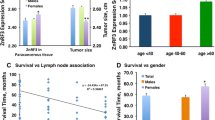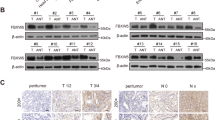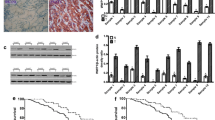Abstract
E3 ubiquitin ligases regulate a variety of biological processes through the ubiquitin–proteasome system, together with ubiquitin activating enzyme E1 and ubiquitin-conjugating enzyme E2. Previous studies have demonstrated that zinc and ring finger 3 (ZNRF3), which belongs to the E3 ubiquitin ligases family is involved in the Wnt signalling pathway, which plays an important role in causing cancer. However, the expression and function of ZNRF3 in human gastric adenocarcinoma still remains unclear. Immunohistochemical and western blot analysis showed a significant down-regulation of ZNRF3 protein in gastric adenocarcinoma tissues compared with adjacent normal gastric tissues. In addition, there was a correlation between the down-regulation of ZNRF3 and poor tissue differentiation in gastric adenocarcinoma. To investigate the potential function of ZNRF3 in cell proliferation and apoptosis, a gastric cell line SGC7901 was employed. The over-expression of wild-type ZNRF3, which was accomplished by the transient transfection of recombinant pEGFP-ZNRF3 (or empty plasmids as control) into the cell line SGC7901, was confirmed by western blot analysis. Flow-cytometry-based and Cell Counting Kit-8 assays showed that over-expression of wt ZNRF3 induced apoptosis and suppressed proliferation. ZNRF3-overexpressing gastric cells displayed partly attenuated protein levels of beta-catenin and TCF-4 compared with those transfected with the empty plasmid. Our study demonstrates a novel gastric adenocarcinoma suppressor and reveals that ZNRF3 inhibits gastric cancer cell growth and promotes the cell apoptosis by affecting the Wnt/beta-catenin/TCF signalling pathway.




Similar content being viewed by others
References
Chen X, Leung SY, Yuen ST, Chu KM, Ji J, Li R, Chan AS, Law S, Troyanskaya OG, Wong J et al (2003) Variation in gene expression patterns in human gastric cancers. Mol Biol Cell 14:3208–3215
Cho LY, Yang JJ, Ko KP, Ma SH, Shin A, Choi BY, Han DS, Song KS, Kim YS, Chang SH et al (2012) Genetic susceptibility factors on genes involved in the steroid hormone biosynthesis pathway and progesterone receptor for gastric cancer risk. PLoS ONE 7:e47603
Clevers H (2006) Wnt/beta-catenin signaling in development and disease. Cell 127:469–480
Clevers H, Nusse R (2012) Wnt/beta-catenin signaling and disease. Cell 149:1192–1205
Freese JL, Pino D, Pleasure SJ (2010) Wnt signaling in development and disease. Neurobiol Dis 38:148–153
Gencer S, Sen G, Dogusoy G, Belli AK, Paksoy M, Yazicioglu MB (2010) beta-Catenin-independent noncanonical Wnt pathway might be induced in gastric cancers. Turk J Gastroenterol 21:224–230
Grossmann TN, Yeh JT, Bowman BR, Chu Q, Moellering RE, Verdine GL (2012) Inhibition of oncogenic Wnt signaling through direct targeting of beta-catenin. Proc Natl Acad Sci USA 109:17942–17947
Hao HX, Xie Y, Zhang Y, Charlat O, Oster E, Avello M, Lei H, Mickanin C, Liu D, Ruffner H et al (2012) ZNRF3 promotes Wnt receptor turnover in an R-spondin-sensitive manner. Nature 485:195–200
Heo SH, Jeong ES, Lee KS, Seo JH, Jeong DG, Won YS, Kwon HJ, Kim HC, Kim DY, Choi YK (2012) Canonical Wnt signaling pathway plays an essential role in N-methyl-N-nitrosurea induced gastric tumorigenesis of mice. J Vet Med Sci [Epub ahead of print]
Kim MS, Kim SS, Ahn CH, Yoo NJ, Lee SH (2009) Frameshift mutations of Wnt pathway genes AXIN2 and TCF7L2 in gastric carcinomas with high microsatellite instability. Hum Pathol 40:58–64
Kolligs FT, Bommer G, Goke B (2002) Wnt/beta-catenin/tcf signaling: a critical pathway in gastrointestinal tumorigenesis. Digestion 66:131–144
Lowy AM, Clements WM, Bishop J, Kong L, Bonney T, Sisco K, Aronow B, Fenoglio-Preiser C, Groden J (2006) beta-Catenin/Wnt signaling regulates expression of the membrane type 3 matrix metalloproteinase in gastric cancer. Cancer Res 66:4734–4741
Ma J, Wang R, Fang X, Sun Z (2012) beta-Catenin/TCF-1 Pathway in T Cell Development and Differentiation. J Neuroimmune Pharmacol 7:750–762
MacDonald BT, He X (2012) A finger on the pulse of Wnt receptor signaling. Cell Res 22:1410–1412
Offerhaus GJ, Giardiello FM, Krush AJ, Booker SV, Tersmette AC, Kelley NC, Hamilton SR (1992) The risk of upper gastrointestinal cancer in familial adenomatous polyposis. Gastroenterology 102:1980–1982
Ogasawara N, Tsukamoto T, Mizoshita T, Inada K, Cao X, Takenaka Y, Joh T, Tatematsu M (2006) Mutations and nuclear accumulation of beta-catenin correlate with intestinal phenotypic expression in human gastric cancer. Histopathology 49:612–621
Okuno K, Sugiura F, Hida J, Tokoro T, Ishimaru E, Ueda K (2011) Preliminary study of Peptide vaccine with UFT/LV as adjuvant setting for stage III colorectal cancer. Gan To Kagaku Ryoho 38:1906–1908
Parkin DM (2004) International variation. Oncogene 23:6329–6340
Pecina-Slaus N (2010) Wnt signal transduction pathway and apoptosis: a review. Cancer Cell Int 10:22
Remmele W, Stegner HE (1987) Recommendation for uniform definition of an immunoreactive score (IRS) for immunohistochemical estrogen receptor detection (ER-ICA) in breast cancer tissue. Pathologe 8:138–140
Schepers A, Clevers H (2012) Wnt signaling, stem cells, and cancer of the gastrointestinal tract. Cold Spring Harb Perspect Biol 4:a007989
Smith MG, Hold GL, Tahara E, El-Omar EM (2006) Cellular and molecular aspects of gastric cancer. World J Gastroenterol 12:2979–2990
Sun Y (2003) Targeting E3 ubiquitin ligases for cancer therapy. Cancer Biol Ther 2:623–629
Sun Y (2006) E3 ubiquitin ligases as cancer targets and biomarkers. Neoplasia 8:645–654
Topol L, Jiang X, Choi H, Garrett-Beal L, Carolan PJ, Yang Y (2003) Wnt-5a inhibits the canonical Wnt pathway by promoting GSK-3-independent beta-catenin degradation. J Cell Biol 162:899–908
Turing AM (1990) The chemical basis of morphogenesis. 1953. Bull Math Biol 52:153–197; discussion 119–152
Ushijima T, Sasako M (2004) Focus on gastric cancer. Cancer Cell 5:121–125
Wieman TJ, Taber SW, Reed DN Jr, Vitale GC (2003) Upper gastrointestinal cancer risk in familial adenomatous polyposis. J Ky Med Assoc 101:142–145
Wolpert L (1969) Positional information and the spatial pattern of cellular differentiation. J Theor Biol 25:1–47
Wu J, Jiao Y, Dal Molin M, Maitra A, de Wilde RF, Wood LD, Eshleman JR, Goggins MG, Wolfgang CL, Canto MI et al (2011) Whole-exome sequencing of neoplastic cysts of the pancreas reveals recurrent mutations in components of ubiquitin-dependent pathways. Proc Natl Acad Sci USA 108:21188–21193
Yagyu R, Furukawa Y, Lin YM, Shimokawa T, Yamamura T, Nakamura Y (2004) A novel oncoprotein RNF43 functions in an autocrine manner in colorectal cancer. Int J Oncol 25:1343–1348
Yoshimatsu K, Yokomizo H, Osawa G, Fujimoto T, Otani T, Tsunoda T, Nakamura Y, Ogawa K (2008) Phase I study of combination therapy with peptide vaccine and anti-cancer drug for colorectal cancer. Gan To Kagaku Ryoho 35:2268–2270
Author information
Authors and Affiliations
Corresponding author
Rights and permissions
About this article
Cite this article
Zhou, Y., Lan, J., Wang, W. et al. ZNRF3 acts as a tumour suppressor by the Wnt signalling pathway in human gastric adenocarcinoma. J Mol Hist 44, 555–563 (2013). https://doi.org/10.1007/s10735-013-9504-9
Received:
Accepted:
Published:
Issue Date:
DOI: https://doi.org/10.1007/s10735-013-9504-9




